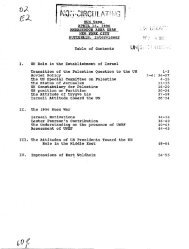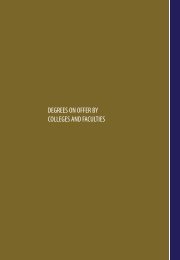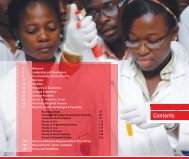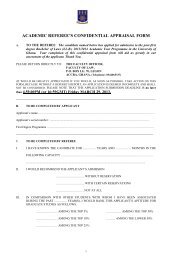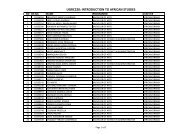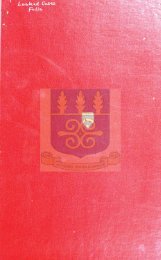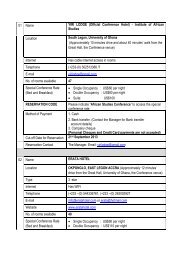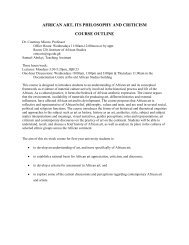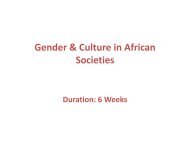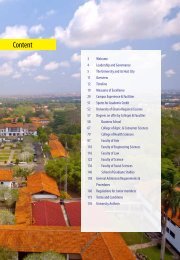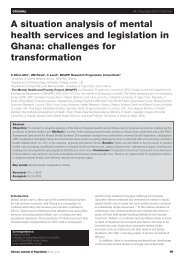Sciences - University of Ghana
Sciences - University of Ghana
Sciences - University of Ghana
Create successful ePaper yourself
Turn your PDF publications into a flip-book with our unique Google optimized e-Paper software.
i. to provide a forum for international meetings, conferences, seminars,<br />
workshops and special events in African music and dance;<br />
ii. to serve as an Archival Documentation and study centre for African Music and Dance;<br />
iii. to promote and coordinate research, creative and development projects in<br />
music and dance;<br />
iv. to prepare and publish monographs, source materials, bibliographies and an<br />
International Journal <strong>of</strong> African Music and Dance, and to serve as a clearing house for<br />
information on events, artists, scholars and institutions concerned with the study and<br />
promotion <strong>of</strong> African music and dance.<br />
The Centre operates as a unit within the School <strong>of</strong> Performing Arts which <strong>of</strong>fers diploma and<br />
degree courses <strong>of</strong> the <strong>University</strong> <strong>of</strong> <strong>Ghana</strong> in music, dance and drama. In addition to<br />
participation in the Centre's programmes, visiting scholars and students affiliated to the Centre<br />
will be able to avail themselves <strong>of</strong> the classes and private lessons in African music and dance<br />
given by the traditional musicians and dance instructors <strong>of</strong> the School as well as the facilities <strong>of</strong><br />
the reference library <strong>of</strong> the Institute <strong>of</strong> African Studies which is adjacent to the School <strong>of</strong><br />
Performing Arts and which has a valuable collection <strong>of</strong> Africana. The Centre is governed by an<br />
International Advisory Board consisting <strong>of</strong> three ex-<strong>of</strong>ficio members and twelve ordinary<br />
members, six <strong>of</strong> whom represent the major sub-regions <strong>of</strong> Africa, while the remaining six<br />
represent institutions and scholars in Asia, Europe, North America, Latin America and the<br />
Caribbean. The Centre has three categories <strong>of</strong> membership:<br />
i. Associate Membership, <strong>of</strong>fered to directors <strong>of</strong> cooperating institutions, scholars in<br />
ethnomusicology, music education, dance ethnology or related fields who have good track<br />
record <strong>of</strong> research and publications, and creative artists who have distinguished themselves<br />
in some area <strong>of</strong> African performing arts.<br />
ii. Ordinary Membership, open to individuals through journal subscription, and<br />
iii. Corporate Membership, <strong>of</strong>fered to music and dance organizations and institutions with<br />
manifest interest in African music and dance.<br />
The programmes <strong>of</strong> the Centre take into account the need for developing materials and resources<br />
that will make it a conference and study centre, a base for the dissemination <strong>of</strong> knowledge and<br />
materials about African music and dance as well as a place for organizing short term training<br />
programmes, including management training seminars in culture and development with<br />
particular reference to African music and dance. To enable scholars and creative artists from<br />
other African countries to contribute to this programme or use the facilities <strong>of</strong> the Centre for<br />
research and writing or presentations, provision has also been made for a few visiting Fellowships.<br />
Other scholars and artists coming on their own can register with the <strong>University</strong> <strong>of</strong> <strong>Ghana</strong><br />
as affiliates or associates <strong>of</strong> the Centre.<br />
OTHER RESEARCH UNITS AND FACILITIES<br />
VOLTA BASIN RESEARCH PROJECT: The Volta basin refers to the approximately<br />
400,000 sq. km drained by River Volta and its tributaries in the West African countries, Cote<br />
d‘Ivoire, Burkina Faso, Togo, Benin, and <strong>Ghana</strong> where the basin makes up about 70 percent <strong>of</strong><br />
the mainland. The Volta Basin Research Project (VBRP) was established by the <strong>University</strong> <strong>of</strong><br />
<strong>Ghana</strong> in 1963 to carry out, through a multi-disciplinary methodology, research into the positive<br />
and negative changes within the Volta basin, following the damming <strong>of</strong> river Volta at Akosombo<br />
and, subsequently, downstream at Akuse, and the consequent creation <strong>of</strong> artificial lakes behind<br />
the dams. As with many major river basin development projects, it was deemed imperative to<br />
conduct pre-impoundment studies on what would be lost irretrievably after the damming,<br />
scientifically monitor and appraise continuously the expected multi-faceted social and economic<br />
impacts, and formulate measures against the many adverse effects that such a major<br />
18



